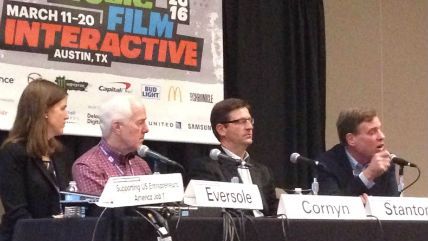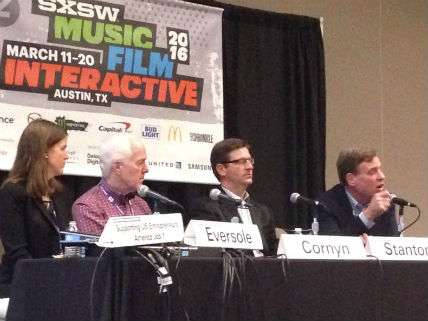Encryption Makes Us Safe, Says Sen. Mark Warner at SXSW
He wants a commission to figure out how to protect our privacy and still allow us to go after the bad guys.


During a panel this morning at South by Southwest Interactive (SXSWi) on how government can be better supporting entrepreneurs, Sen. Mark Warner (D–Va.) at one point steered the conversation toward the importance of "digital security," specifically raising the locked iPhone controversy as an example.
"I firmly believe that encryption makes us safe," he said. "We need encrypted systems. If we throw this into the political realm and we come up with a static one-time solution, we could end up not making Americans safer, but simply driving all the bad guys to use foreign-based hardware and software. That's not where we want to end up."
To recap, the FBI is demanding Apple help it get into a locked device that belonged to one of the deceased San Bernardino terrorists. The tech giant is insisting that any steps it might take to weaken the phone's security settings would render all its customers' information less secure and is refusing to comply.
Warner's position isn't that Apple is right and law enforcement should stand down, though. He thinks it's important for Congress to develop a policy solution for future conflicts that's respectful of the concerns all sides. "Frankly, it's disappointing to me that both Apple and the Justice Department and the FBI are taking such absolutist positions," he told me. "Having this litigated out in a variety of courts around the country is not the way to get this resolved."
His solution is to convene a 9/11-style "commission" to work through how situations like this ought to be handled going forward. He acknowledged to me that "often a commission ends up being a Washington way to punt on a problem," but believes that because "this is one that's so complex and so necessary that we get right," it makes sense to bring people together "and force those conversations to take place."
"There are technological solutions that will protect our privacy and still allow us to go after the bad guys. But you've got to get everybody in a room—the technologists, the civil libertarians, the intel community, and think about this not only in terms of the current state of play," but also in terms of what might be coming, he said during the panel. "Because if you think this is tough, wait until we move into the so-called 'Internet of Things'…The privacy concerns are going to be exponentially larger, and we need to get ahead of that."


Show Comments (35)